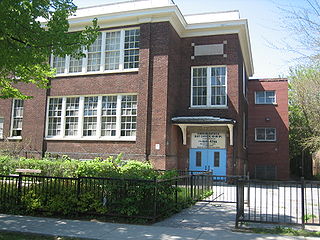Related Research Articles

The Sudbury Valley School was founded in 1968 by a community of people in Framingham, Massachusetts, United States. In 2019, several schools stated that they were based on the Sudbury Model in the United States, Australia, Belgium, Canada, France, Germany, Israel, Japan and Switzerland.
Alternative education encompasses many pedagogical approaches differing from mainstream pedagogy. Such alternative learning environments may be found within state, charter, and independent schools as well as home-based learning environments. Many educational alternatives emphasize small class sizes, close relationships between students and teachers and a sense of community.

School discipline relates to actions taken by teachers or school organizations toward students when their behavior disrupts the ongoing educational activity or breaks a rule created by the school. Discipline can guide the children's behavior or set limits to help them learn to take better care of themselves, other people and the world around them.
Educational assessment or educational evaluation is the systematic process of documenting and using empirical data on the knowledge, skill, attitudes, aptitude and beliefs to refine programs and improve student learning. Assessment data can be obtained from directly examining student work to assess the achievement of learning outcomes or can be based on data from which one can make inferences about learning. Assessment is often used interchangeably with test, but not limited to tests. Assessment can focus on the individual learner, the learning community, a course, an academic program, the institution, or the educational system as a whole. The word "assessment" came into use in an educational context after the Second World War.

In education, a curriculum is broadly defined as the totality of student experiences that occur in the educational process. The term often refers specifically to a planned sequence of instruction, or to a view of the student's experiences in terms of the educator's or school's instructional goals. A curriculum may incorporate the planned interaction of pupils with instructional content, materials, resources, and processes for evaluating the attainment of educational objectives. Curricula are split into several categories: the explicit, the implicit, the excluded, and the extracurricular.
Minimally invasive education (MIE) is a form of learning in which children operate in unsupervised environments. The methodology arose from an experiment done by Sugata Mitra while at NIIT in 1999, often called The Hole in the Wall, which has since gone on to become a significant project with the formation of Hole in the Wall Education Limited (HiWEL), a cooperative effort between NIIT and the International Finance Corporation, employed in some 300 'learning stations', covering some 300,000 children in India and several African countries.
A Sudbury school is a type of school, usually for the K-12 age range, where students have complete responsibility for their own education, and the school is run by a direct democracy in which students and staff are equal citizens. Students use their time however they wish, and learn as a by-product of ordinary experience rather than through coursework. There is no predetermined educational syllabus, prescriptive curriculum or standardized instruction. This is a form of democratic education. Daniel Greenberg, one of the founders of the original Sudbury Model school, writes that the two things that distinguish a Sudbury Model school are that everyone is treated equally and that there is no authority other than that granted by the consent of the governed.

Framingham State University(Framingham State or FSU) is a public university in Framingham, Massachusetts. The university, then known as the Normal School in Lexington was founded in 1839 as the first state-supported normal school in the United States before becoming a full-fledged university. It offers undergraduate programs as well as graduate programs, including MBA, MEd, and MS.

Lincoln-Sudbury Regional High School is a public regional high school in Sudbury, Massachusetts, with a 99% graduation-rate. The school was founded in 1954, and the building was replaced prior to the 2004–2005 academic year, with additional facilities added in subsequent years.

Democratic education is a type of formal education that is organized democratically, so that students can manage their own learning and participate in the governance of their school. Democratic education is often specifically emancipatory, with the students' voices being equal to the teacher's.

The Circle School is a self-directed democratic school located in Harrisburg, Pennsylvania, and founded in 1984, and is operated similarly to the Sudbury Valley School and Hudson Valley Sudbury School. It enrolls pre-kindergarten through high school aged children. The Circle School currently has approximately 80 students enrolled and 6 full-time staff members. It is one of three Sudbury-like schools in Pennsylvania and one of the oldest in the world.
Critical consciousness, conscientization, or conscientização in Portuguese, is a popular education and social concept developed by Brazilian pedagogue and educational theorist Paulo Freire, grounded in neo-Marxist critical theory. Critical consciousness focuses on achieving an in-depth understanding of the world, allowing for the perception and exposure of social and political contradictions. Critical consciousness also includes taking action against the oppressive elements in one's life that are illuminated by that understanding.
Freedom to Learn (FTL) is a statewide education program in Michigan helping schools create high performing, student-centered learning environments by providing each student and teacher with direct, consistent access to 21st century learning tools.

The Beach School was a democratic free school in Toronto based on the Sudbury principles of education. The model has two basic tenets: educational freedom and democratic governance. Small and independent, The Beach School was a community of self-motivated learners, aged 4–19, who determined their own curriculum, and each had an equal voice in school governance. Located at 42 Edgewood Ave near Kingston Road and Dundas Street East, the school opened in the fall of 2003 and closed in June 2008 owing to a shortage of students. The Beach School was incorporated as a co-operative and, at the time of closing, was one of two Sudbury schools in Canada; the only one in Ontario.
Student-directed teaching is a teaching technology that aims to give the student greater control, ownership, and accountability over his or her own education. Developed to counter institutionalized, mass, schooling, student-directed teaching allows students to make their own choices while they learn in order to make education much more meaningful, relevant, and effective.

Fairhaven School was founded in 1998 in Upper Marlboro, Maryland. It is one of over 30 schools based on the Sudbury Model. The model has two basic tenets: educational freedom and democratic governance. It is a private school, attended by children from the ages of 5 to 19. The school was founded by Mark and Kim McCaig after learning about Sudbury Valley School in Framingham, Massachusetts.
Daniel A. Greenberg, was one of the founders of the Sudbury Valley School, has published several books on the Sudbury model of school organization, and was described by Sudbury Valley School trustee Peter Gray as the "principal philosopher" among its founders. He was a physics professor at Columbia University, and was described by Lois Holzman as the school's "chief 'philosophical writer'".
An ungraded school is a school that does not formally organize students according to age-based grade levels. Students' achievements are assessed by teachers, and each student is individually assigned to one of several fluid groups, according to what the student needs to learn next.
The Philadelphia Free School also known as Philly Free School or PFS, is a Democratic Free School in Philadelphia, Pennsylvania. Philly Free School operates on the democratic education or Sudbury school model. The school opened in the fall of 2011 and offers a sliding scale tuition to students ages 4 to 19.
References
- ↑ Sudbury Valley School • About SVS - School Days Archived 2009-02-19 at the Wayback Machine Retrieved September 2, 2013.
- ↑ Ellis, Arthur K. (2004). Exemplars of curriculum theory. Eye on Education. ISBN 1-930556-70-5.
- ↑ "Education: Class Dismissed". Psychology Today. 2006-05-01. Retrieved September 2, 2013.
Since 1991, more than three dozen Sudbury-type schools have sprouted around the country and the world.
- ↑ "Other Schools". Archived from the original on 2018-04-25.
- ↑ Greenberg, Daniel (2016). A Place to Grow. Sudbury Valley School Press. ISBN 978-1-888947-26-7.